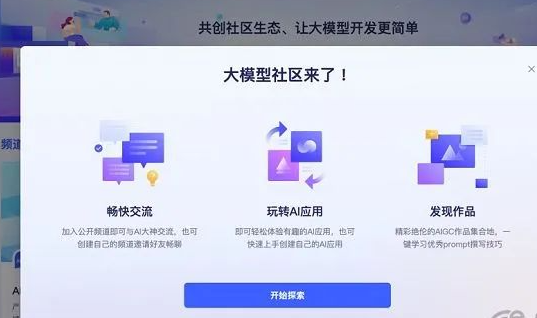After Shedding Gaming Burden, ByteDance Immediately Shifts Focus to AI Large Models
-
After a complete withdrawal from the gaming sector, ByteDance has chosen to continue investing heavily in the AI field. Recent reports show that ByteDance has established a new department, Flow, focused on AI innovation. The technical lead is Hong Dingkun, Vice President of Technology, while Zhu Wenjia, Head of TikTok Product Technology and leader of the large model team, serves as the business lead. Prior to this, the department had already launched two AI conversational products, Doubao and Cici, targeting domestic and overseas markets respectively, with several other AI innovation products currently in development.

According to reports citing insider information, the establishment of the Flow department is part of ByteDance's recent series of business and structural adjustments earlier this month. Personnel were transferred from mature departments such as Feishu and Douyin to participate in the development of a C-end product in this new department. The creation of this department signifies ByteDance's multi-pronged approach in the AI sector, covering everything from foundational general large models to large model service platforms providing technical and service capabilities, all the way to user-facing application layers—almost a comprehensive coverage.
Unlike traditional giants like BAT or fellow internet newcomers such as Kuaishou and Meituan, ByteDance seemed to lag behind when numerous internet companies collectively joined the "Hundred Models Battle." It wasn't until August this year that ByteDance released its chatbot product, Doubao, by which time Baidu's Ernie Bot had already undergone an iteration.
In fact, ByteDance initially entered the generative AI race not through large AI models but via the large model service platform "Volcano Ark," which offers enterprises comprehensive platform services including model fine-tuning, evaluation, and inference.
ByteDance aims to leverage Volcanic Ark to build a large model marketplace for the enterprise market, known as MaaS (Model as a Service), which emphasizes a rigorous security and trust mechanism while balancing flexibility and safety. To foster trust between model providers and users, Volcanic Ark has introduced a secure sandbox-based large model trust computing solution. To attract large model companies, ByteDance is offering idle computing resources at lower prices than competitors.
The problem, however, is that the domestic AI large model market is fiercely competitive, and most AI models currently available are only "barely usable" in terms of performance, falling far short of OpenAI's GPT-4. As a result, very few enterprises are willing to purchase domestic AI models to enhance their operations. This has led to slow progress for the MaaS model in China, which connects AI model developers with users, due to incomplete market education and significant performance gaps.

With MaaS facing challenges, building an app store ecosystem based on general large models has become a new strategy for ByteDance and other domestic internet giants. Robin Li, Chairman and CEO of Baidu, has consistently emphasized that "large models themselves are a foundational platform, similar to an operating system, and ultimately developers will rely on a limited number of large models to create various native applications."
Now, everyone hopes to replicate the success of the App Store in the AI era, especially after the launch of OpenAI's GPTs, which has sparked enthusiasm and envy among domestic tech giants.
The issue is that everyone knows the app store economy is profitable. The App Store has already helped Apple amass hundreds of billions of dollars in wealth, and naturally, everyone wants a piece of this big pie. However, unlike ChatGPT's unparalleled dominance in overseas markets, domestic AI large models are more or less on par in terms of performance, especially after Meta's Llama2 became open-source, making AI large models widely accessible.
In other words, when it's difficult for various large models to show significant performance differences, the one that can implement applications addressing users' essential needs might be the first to establish its own ecosystem.
Ultimately, AI large models must serve life and production, solving practical problems in work, study, and daily life, thereby improving work efficiency and productivity. This is why ByteDance established the Flow department to promote the development of AI application layers.
So the question arises: ByteDance, known as the 'App Factory' in the mobile internet era, excels at assembly-line production of hit apps, but can it extend this capability to AI applications?
In recent years, ByteDance's previously successful 'brute force miracles' product methodology seems to have lost its effectiveness. From 2021 to the present, the company has launched over 10 new apps, including Douyin Box, Shiqu, Party Island, and Korsang, but apart from Soda Music, almost all others have vanished without a trace. Since 2020, except for e-commerce represented by live-streaming sales, ByteDance's unbounded expansion in the consumer internet—from social media to online education and gaming—has yielded unsatisfactory results.
If we consider Douyin's rise in 2017 as the starting point, ByteDance's biggest hit in the past six years has been TikTok in overseas markets. The reason behind the failure of its hit-making methodology is straightforward: the era of internet traffic growth in China is over, as market penetration has peaked. Meanwhile, Douyin has evolved into an all-encompassing super-app. Under these dual influences, diverting traffic from Douyin to nurture a new app may be less effective than simply adding new features directly to Douyin.
While it's often said that 'it's easy to stay cool under a big tree,' the reality is that only shrubs grow beneath it—not towering trees. Currently, ByteDance faces an even more critical challenge in exploring new businesses: the need to shift its mindset. In a way, the company's decisive moves to abandon PICO and Zhaoxi Guangnian share the same underlying logic.
That is, if a product is made by a team of 10 people in half a year, then a team of 100 people should theoretically be able to complete it in half a month. Zhaoxiguangnian serves as a typical example of this approach, where ByteDance's strategy involves pouring in more resources, hoping to catch up with Tencent Games' two decades of accumulation within three to four years. However, the problems outlined in 'The Mythical Man-Month'—a software engineering bible that has been around for nearly half a century—are almost perfectly replicated in Zhaoxiguangnian's case.
Therefore, preventing the Flow department from repeating Zhaoxiguangnian's mistakes might be more crucial than rushing to produce a hit product.
